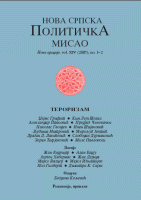Terorizam kao instrument oslobođenja: stanovište ideologije oslobođenja
Terrorism as an Instrument of Liberation
Author(s): Aleksandar PavkovićSubject(s): Politics / Political Sciences
Published by: Nova srpska politička misao
Keywords: ideologies of liberation; universal humanism; oppressors; the oppressed; system of oppression; moral virtue; justification for terrorism; aim; means; violence;
Summary/Abstract: Global terrorism is a classic example of the ideology of violent liberation. From the points of view of philosophy and ethics, the author first analyzes the attempt to justify terrorism in the context of its ideology and comments about objections made to terrorism from the point of view of universal humanism. In order to clarify the main disagreements in ethical principles and values of the two points of view, the author points to the similarity between Fanon’s concept of ideology of liberation and aims and justification for Osama bin Laden’s terrorism. The conceptual framework based on the relationship oppressor versus the oppressed functions by analogy in both cases, and they are based on the belief about moral superiority of the oppressed group. At the same time, ideologies of liberation are based on two different patterns of normative justification for terrorism viewed as the right to seek collective revenge and as justification based on the relationship between the aim and means. In the second part of the paper the author analyzes Kant’s view of universal humanism and crucial difference between this standing and the selective approach of the ideology of liberation towards the value of human life. The author points to the fact that the limitation of the humanism of liberation is in a call for political and therefore contingent criteria, whereas universal humanism is a primarily ethical and unbiased concept. The fact that the applicability of this concept in specific circumstances is challenged consequently points to the possibility and necessity of developing the standing of universal humanism, but also points to its limitations.
Journal: Nova srpska politička misao
- Issue Year: 14/2007
- Issue No: 01+02
- Page Range: 45-67
- Page Count: 21
- Language: Serbian
- Content File-PDF

